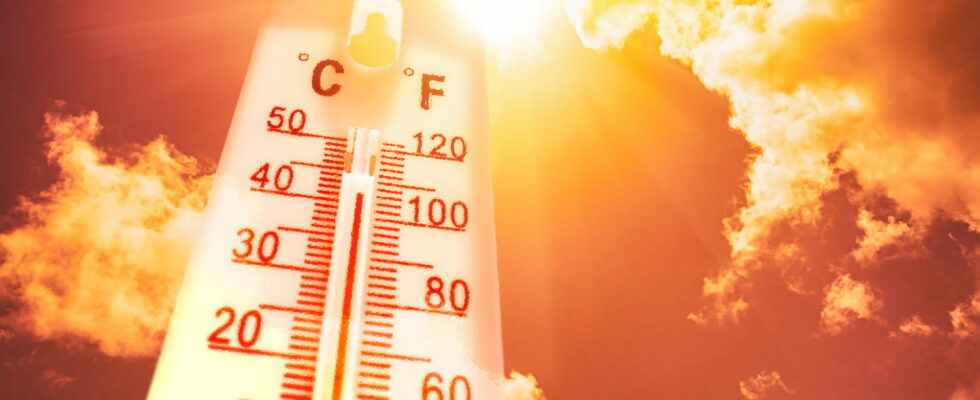A term often used in the news, greenhouse gases (GHGs) are responsible for global warming. Limiting their emissions is one of the world’s priorities. What are the main greenhouse gases? CO2? Do they have health consequences?
The greenhouse gas (abbreviated GHG) are gases, mainly emitted by human activities (transport, habitat, heating, industry, agriculture) which accumulate at high altitude and cause a rise in temperatureresponsible for global warming observed on a global scale. What are these gases? How are they issued? Do they have health consequences ? If we breathe them? Explanations with Antoine Trouche, Engineer for AIRPARIFthe air observatory in Ile-de-France.
Definition: what is a greenhouse gas?
“Simply put, greenhouse gases are gases that reinforce a phenomenon called “greenhouse effect“. This phenomenon causes a rise in average temperatures on the surface of the globe, explains our interlocutor. When emitted, greenhouse gases accumulate in the air. The sun’s rays warm the Earth, which then re-emits some of this radiation to space. But this radiation is largely absorbed by these greenhouse gases, which then re-emit them in all directions, and in particular towards the Earth.. So the more there is a large quantity of greenhouse gases in the atmosphere, the more there is a large part of the Sun’s rays which are re-emitted towards the Earth and this causes global warming (see diagram below)” Important: greenhouse gases are not the same as air pollutants (or atmospheric pollutants), which themselves are not responsible for global warming, but which have negative health effects (cardiovascular effects, eye irritation, asthma attacks, development of cancer, etc.).
What is the list of the main greenhouse gases?
Among the main greenhouse gases are:
- the carbon dioxide (CO2)
- Methane (CH4)
- Nitrous oxide (N2O)
- Hydrofluorocarbons (HFCs)
- Perfluorocarbons (PFCs)
- ozone (O3) low altitude (which is quite different from the ozone layer, high altitude)
- Water vapor (H2O) (water vapor is not responsible for global warming because it is not a greenhouse gas that can accumulate in the atmosphere)
Is CO2 a greenhouse gas?
Yes. Carbon dioxide (CO2) is the first greenhouse gas emitted by man. It is responsible for half of current global warming (summary of the IPCC report) because its ability to retain heat is very high, can we read on the website of the Parisian Climate Agency. We also measure the effect of other gases in relation to it by CO2 equivalent. CO2 is mainly emitted by the combustion of fossil fuels (transport, industry, agro-food, habitat…), by theagriculture and by the deforestation (change in land use). Its lifetime in the atmosphere isabout 100 years old.
Causes: what emits a greenhouse gas?
Greenhouse gases are mainly emitted by human activities. “We have just released a study and in Ile-de-France, greenhouse gases are emitted at 80% by the residential and tertiary sector : about 1/3 of greenhouse gases are emitted by road transport and about 50% are emitted by heating (gas, fuel, etc.) and indirectly through the production of the electricity we consume”answers Antoine Trouche.
What are the health risks of greenhouse gases?
“Greenhouse-effect gas have no direct impact on human health. For example, when we breathe in the CO2 present in the outside air, there is no impact on health. On the other hand, greenhouse gases have consequences indirect. Indeed, since greenhouse gases are responsible for global warming, they lead to various disasters (larger and more frequent heat wavesincreasingly heavy precipitation, storms, tornadoes, cyclones…) which they entail health risks. Typically, during hot weather, more deaths are reported. For instance, in 2003, Public Health France reported 15,000 additional deaths because of the heat wave“, recalls our expert. For thesummer 2022 (second hottest summer since 1900), Public Health France reported a excess mortality of 2,816 deathsbe one relative excess mortality of +16.7%.
What are the consequences of greenhouse gases? On the environment ?
The main consequence of greenhouse gases is therefore global warming. The massive release by human activities of greenhouse gases – these are mainly carbon dioxide, methane and nitrous oxide which are problematic – accentuates this warming: +1.1 to +6.4°C by the end of the century according to the latest IPCC report. “The ohobjectives of the Paris Agreement aim to limit our greenhouse gas emissions quickly and intensely enough to limit the rise in the Earth’s temperature by 1.5 to 2°C. To date, global warming has already caused a rise in temperature of 1.1°C. In Île-de-France as everywhere in France, we are required to respect the trajectory of the National Low-Carbon Strategy which sets targets for reducing greenhouse gas emissions. These objectives aim to ensure that France achieves carbon neutralityin other words, to ensure that a balance is reached between the greenhouse gas emissions emitted and the greenhouse gases captured by the vegetationexplains Antoine Trouche. And therefore contribute to stopping the worsening of global warming”
Thanks to Antoine Trouche, Press Relations and Scientific Media Engineer for AIRPARIF
Sources: Ministry of Ecological Transition / AIRPARIF website / IPCC report 2022
